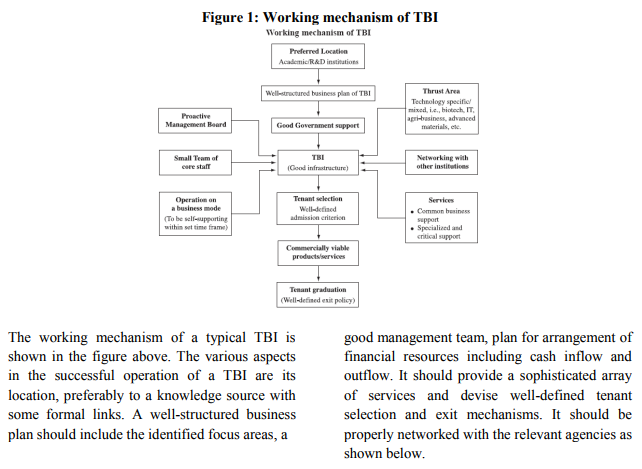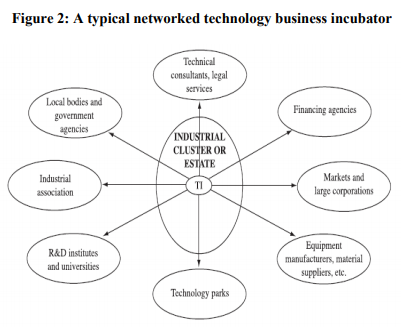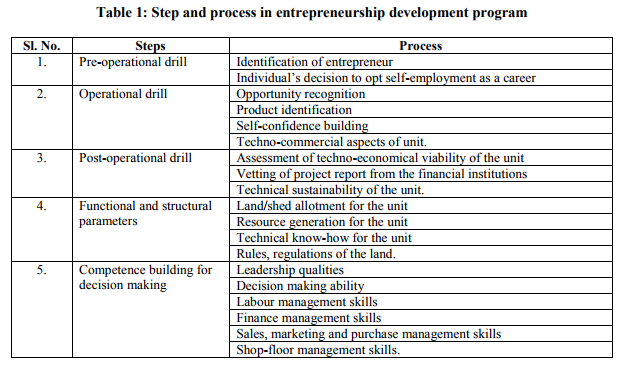IJCRR - 3(10), October, 2011
Pages: 136-142
Print Article
Download XML Download PDF
THE SUPPORTIVE ROLE OF TECHNOLOGY BUSINESS INCUBATORS ON SUSTAINABLE GROWTH AND
PROFITABILITY OF SMALL AND MEDIUM ENTERPRISES
Author: Vinay. K. B, A. N. Santosh Kumar
Category: Technology
Abstract:Today, the entrepreneurial, knowledge-based enterprises are prime indicators of economic growth which
need special business development services. Since, no consensus has been reached yet on the most
effective means of providing such support or on the methods for evaluating the performance of these
services. However, the support required for its sustainability, growth and profitability is being provided
with the establishment of Technology Business Incubators. The increase in number of small enterprise
development strategies reflects the growing importance of the small and medium enterprises (SME's). In
particular, the Technology Business Incubators are emerging foci of entrepreneurial assistance program
and their supportive role concerns the formation and promotion of viable enterprises. It is argued that the
incubators are innovative instruments that are increasingly considered to be of prime importance in the
development and promotion of competitive small firms. This paper aims to assess the supportive role of
Technology Business Incubators on sustainability, growth and profitability concerns of SME's.
Keywords: EDP, profitability, sustainability.
Full Text:
1. INTRODUCTION
Today Small and Medium Enterprises (SME‘s) are the prime source for creation of employment, incubating business ideas and main driver for innovation but technological obsolescence is a major obstacle as far as sustainability and growth of SME‘s is concerned. Identifying Technology, its acquisition, transfer, adoption and upgradation are the key issues of these SME‘s. The SME‘S in India has emerged as the most dynamic and vibrant sector in recent years with the encouragement from the Government when a centrally sponsored scheme known as ?District Industries Centre‘ was launched throughout the country with an aim to provide necessary services. But the great challenge is its survival and to create a place for themselves in the global community chain where advanced manufacturing methods are predominant. To overcome the challenges of Technology obsolescence, competitive global market and sustain the growth of SME‘S sector, entrepreneur need to be creative, innovative, well acquainted with the latest technology, sophisticated machines and equipments. Entrepreneur finds it very difficult to cope up with the fast technological changes apart from other challenges with limited resources available at their hands. Particularly when it comes to Research and Development for Technology Up gradation with the investments and uncertainties involved they have to look forward to Technical and Research Institutions and universities [1].
2. SME’S IN INDIA – A VISION
Performance of SME‘s in India has been constantly out-performing large scale enterprises in terms of production and employment. Basic accent of India‘s policy for SME‘S sector has been defensive, aiming to protect from dynamics of the competitive growth. The process of change has accelerated in most recent years due to macroeconomic transformation both in house as well globally. In the present situation the two big global economic forces which are competing for world attention are (a) the advent of a new economy due to information and communication technology and (b) due to globalization increased instability and uncertainty. With the formation of WTO, a new trade environment is emerging and a large number of items are now under Open General License (OGL). In the recent times there has been reduction in import duties. These have thrown a challenge before the SME sector which warranted them to be more competitive and efficient to face the international competition successfully. Further, consumer‘s choice, preference and their quality are varying a lot. To cope up with these changes, the SME sector will have to undergo many internal and external transformations.
3. NEED OF TECHNOENTREPRENEURSHIP The role of Techno - Entrepreneurship assumes an important place in the fast changing environment. The science based entrepreneurial engineer aims at technical intervention like invention, innovation, planning and management organization to exhibit to produce new products/services and market that can recognize as valuable by society [2]. Necessity of developing creative design, methodology, or several of them to suit individual idiosyncrasy is unquestionable. Developing creativity needs insight, to develop necessary insight, it is only one method of presenting the principles from known to unknown, from old concepts to new one, involving several laws develops confidence in meeting uncertainty with initiative and originality [3]. Educators has to overcome the traditional disciplinary barriers for what it is a multi-disciplinary approach with heavy emphasis on economic, business and entrepreneurial skills [4]. Engineer who learns sufficient science and engineering acquire capabilities to know why and how of various theories and can design products and services based on their knowledge and skill competencies [5]. Techno - Entrepreneurs have received increased attention over the past decade and now recognized their ability to develop units that generate high wage employment and high levels of wealth [6]. A technologically vibrant, internationally competitive SME‘S sector should be encouraged to emerge, to make a sustainable contribution to national economy [7]. A close relationship exists between enterprise and entrepreneurship. While not exactly the same, they merge significantly in an educational context with respect to the specific learner attributes they pursue and the development of which they treat as key objectives. Major divergence between the two exists in, on the part of entrepreneurship education, the reliance on venture creation [8]. The task, therefore, is to create a culture where Science and Technology people will seek to create employment not only for themselves but also for others.
4. TECHNOLOGY BUSINESS INCUBATORS Entrepreneurs and successful start-up companies contribute to industrial growth and economic wealth incubators have become an important source of help for entrepreneurs wanting to beat the odds and jumpstart their businesses [9].
Earlier business incubators used to focus on new technology, light manufacturing, and services. Today‘s incubators target diverse industries such as biotechnology, clean energy, ceramics technologies, the internet, software and telecommunications, high technology, and the arts [10]. Incubators have variously been used to combat unemployment, raise rates of enterprise formation, upgrade the technological standing of firms in a given locality, commercialize university research, and assist socially disadvantaged groups. In a small number of cases, incubation applies a way of protecting legitimate entrepreneurship from criminal activity. However, job creation is by far the most common goal of incubation schemes [11].
Various enabling factors crucial for the success of incubating mechanisms in a country are RandD expenditures, new technologies, RandD, Resources, Technology, Production, Costs and Socio-economic conditions. Start up entrepreneurs need various support services like marketing, business facilitation, technical expertise, resources for financing and business management during their initial phase to enhance its survival. Incubators provide a conducive atmosphere and a range of critical support services and needed facilities to nurture and support a start-up. Various mechanisms like science parks, technology parks, innovation centres, Technology Business Incubators (TBI‘s) are being experimented world over to catalyse growth of technology based new enterprises.


5. TECHNOLOGY BUSINESS INCUBATORS IN INDIA – AN OVERVIEW The Techno – Entrepreneurship initiative was started by the Department of Science and Technology (DST) in 1985 through the establishment of Science and Technology Entrepreneurship Parks (STEP), which provide a reorientation approach to innovation and entrepreneurship involving education, training, research, finance, and management. The concept revolved around the creation of STEP in academic institutions / research lab of excellence with an objective of opening doors of self employment for young Science and Technology graduates. Technology Business Incubator is the next initiative to incubate knowledge-based start-ups into commercially viable products / services by providing specialized guidance, critical support services, innovative financing and networking support with supporting environment. World wide around 3,000 plus incubators of various types are in operation, in which US alone over 800 incubators, Europe has about 700 incubators, Germany has around 300 incubators.
Among the developing countries, China leads with 100 incubators while In India, Department of Science and Technology, Government of India, has initiated promotion of Technology Business Incubation and in addition several other ministry‘s and private players have established TBI‘s which is nearing 100. The TBI‘s are aimed at achieving the following objectives:
- Enterprise and entrepreneurship development: An appropriate tool for economic development by promoting technology/knowledge-based businesses, culture of technopreneurship and creation of value added new jobs;
- Technology commercialization: To provide a platform for speedy commercialization of the technologies developed in the institutes to reach the end-users;
- To provide an interfacing and networking mechanism between academic, RandD institutions, industries and financial institutions;
- To provide value addition through its services provided to its tenants as well as to the existing technology dominated SME‘s
- To provide RandD for industry: It also enables small industry to take up RandD activity and the technology upgradation activities.
6. SUPPORTIVE ROLE OF TBI IN NURTURING SME’S For TBI to play a supportive role for sustainability, growth and profitability of SME‘s, there is a need to analyse the specific expectation of SME‘s from Technical Institutions and the input required by the Technical Institutions, related to TBI‘s. Since SME‘s has the limited resources and therefore,can not afford to have their own RandD. Hence entrepreneur looks forward technical institutions to get their problems sorted out which inturn needs to impart entrepreneurial awareness and more industrial exposure to realize the industrial problems and requirements of industry. Entrepreneurial awareness in the engineering institution‘s curriculum needs to be mandatory. Entrepreneurial Development Program (EDP) should be practically oriented with industrial orientation and can be carried out as per the following five steps as shown in Table 1

Entrepreneurial awareness and Entrepreneurial Development Program may yield the following outcomes.
- To be well versed with production line and to operate the process.
- To guide operational staff at different level of shop floor.
- To know the choice of raw materials, their specifications, availability, quality, source of supply price etc
- . To know the product quality requirements and measures for improving it.
To study the marketing channels, distribution networks, agency practices.
- To get well versed with taxation and other regulatory rules.
- To be inline with bureaucratic regulations, external environmental turbulence.
- To identify the opportunity and avail opportunity benefits.
- To follow five ?P‘ principles i.e. Planning, Preparation, Persuasion, Patience, and Perfection for running industrial venture successfully.
- To be physically and mentally strong to face competition from the similar units and business rivals.
7. CONCLUSIONS AND SUGGESTIONS
Indian SME‘S face several problems despite its importance in industrialisation strategy and potential for employment generation. Technological obsolescence and ineffective technology management are some of the reasons. Therefore, to overcome the barriers in the development SME‘s the industrial organizations needs not only engineers with technical knowledge but engineers with entrepreneurial skills, effective communication and soft skills, ability to lead and work effectively in a multidisciplinary team. In fast changing world, wherein technology is leapfrogging beyond the speed of light and product lifetime cycle is shrinking, Techno - Entrepreneurship has taken central position for economic growth of a nation and in the process of industrialization through innovations, product development, and improvement in productivity. To cater the need for effective business support TBI is essential and it provides a good platform for the convergence of support mechanisms towards a synergetic third generation system. Hence, a systematically designed Entrepreneurship Development Programme (EDP) can be can be more constructive in imparting engineers with entrepreneurial fold and inculcating them to take the benefit of TBI‘s. In next 10 years, knowledge-based industries are likely to acquire greater prominence and SME‘s are likely to come up in the industry. The role of the Government is to facilitate support to SME‘s in the era of globalization and to focus on providing human resource development support along with establishment of suitable support mechanisms and nurture technology oriented enterprises. Some of the suggestions where there is a need to cater includes;
- Availability of Technology database.
- Panel of experts and consultants for guidance and assistance for SME‘s.
- Organizing workshops, exhibitions and seminars to increase SME awareness of new technologies.
- Periodical assessment of SME sectors. Strengthening interaction between SME‘s with RandD sectors and academic Institutions.
- Increase Venture Capital funding and facilitate access to venture capital scheme and other innovative financing mechanisms.
- Effective networking with other RandD institutions for making the TBI a focal point for technology.
References:
|






 This work is licensed under a Creative Commons Attribution-NonCommercial 4.0 International License
This work is licensed under a Creative Commons Attribution-NonCommercial 4.0 International License